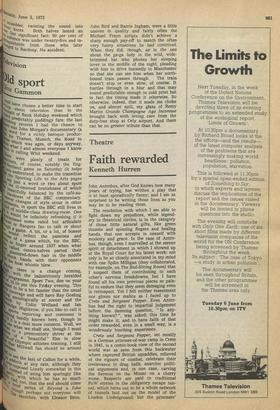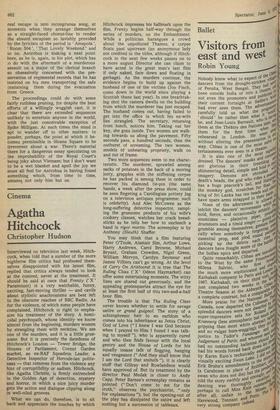Theatre
Faith rewarded
Kenneth Hurren
John Antrobus, after God knows how many years of trying, has written a play that is at least sporadically funny; and I am as surprised to be writing those lines as you may be to be reading them.
The resolution with which I am able to fight down my prejudices, while legendary in theatrical circles, is in the category of those little natural gifts, like green thumbs and spinning fingers and healing hands, that one accepts in oneself with modesty and grace. In the case of Antrobus, though, even I marvelled at the serene spirit of detachment in which I showed up at the Royal Court for his latest work: not only is he so closely associated in my mind with one Spike Milligan (they collaborated, for example, on The Bed-Sitting Room) that I suspect them of contributing to each other's nervous breakdowns, but I have found all his own previous pieces so painful to endure that they seem damaging even in retrospect. Yet I felt neither resentment nor gloom nor malice as I faced up to Crete and Sergeant Pepper. Even Antrobus had the right to impartial judgement before the damning question, "Is anything known? ", Was asked; this time he might make it; and to have faith of that order rewarded, even in a small way, is a wondrously touching experience.
Crete and Sergeant Pepper, set mostly in a German prisoner-of-war camp in Crete in 1941, is a comic-book view of the second world war as seen from this backwater where captured British squaddies, relieved of the rigours of combat, celebrate their irrelevance in drag balls, anarchic political arguments and, in one case, carving the Sermon on the Mount on a cherry stone. Respects are paid to traditional PoW stories in the obligatory escape tunnel, which turns out to be a whole network of tunnels laid out on the model of the London Underground; but the prisoners' real escape is into incongruous song, at moments when they arrange themselves as a straight-faced chorus-line to render the absurd escapism so lavishly provided by the lyricists of the period in ' Amapola 'Room 504 'That Lovely Weekend' and so on. Antrobus is making a neat point here, as he is, again, in his plot, which has :0 do with the aftermath of a murderous assault on a major of the clerical branch so obsessively concerned with the preservation of regimental records that he has insisted on his men transporting the safe containing them during the evacuation from Greece.
The proceedings could do with some fairly ruthless pruning, for despite the best efforts of a willingly waggish cast, it is clear that there are extended sequences unlikely to entertain anyone in the world, with the just conceivable exception of Spike Milligan. At such times the mind is apt to wander off to other matters: to ponder, perhaps, the point at which it becomes permissible in Sloane Square to be irreverent about a war. There's material there for a dangerous essay speculating on the improbability of the Royal Court's being joky about Vietnam; but I don't want to be a wet blanket and spoil the joy we must all feel for Antrobus in having found something which, from time to time, amuses, not only him but us.













































 Previous page
Previous page